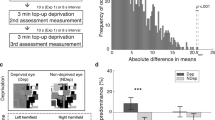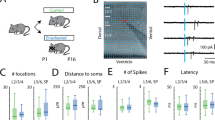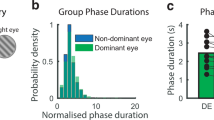Abstract
In cats and monkeys, monocular deprivation in early life results in an extensive reduction of the capability of the deprived eye to activate visual cortical cells1, apparently because of changes taking place in the visual cortex itself rather than at an earlier stage in the visual pathway2. The nature of the change taking place in the cortex is the subject of some controversy. One line of evidence favours a redistribution of the excitatory terminals relating to the two eye inputs3–5 whilst another suggests that the deprived eye input is in some way suppressed6, possibly by γ-aminobutyric acid (GABA)-mediated intracortical inhibition7. We have now sought to clarify the role of this type of inhibitory influence in monocularly deprived cats, by ascertaining whether there is an enhancement of the deprived eye input to visual cortical cells during the iontophoretic application of the GABA antagonist, N-methyl-bicuculline (NMB). Our experiments show that although intracortical inhibition may submerge the deprived eye input to some cells, it is unlikely to precipitate the cortical effects of monocular deprivation. The redistribution of excitatory terminals would seem to be a more significant factor.
This is a preview of subscription content, access via your institution
Access options
Subscribe to this journal
Receive 51 print issues and online access
$199.00 per year
only $3.90 per issue
Buy this article
- Purchase on Springer Link
- Instant access to full article PDF
Prices may be subject to local taxes which are calculated during checkout
Similar content being viewed by others
References
Wiesel, T. N. & Hubel, D. H. J. Neurophysiol. 26, 1003–1017 (1963).
Wiesel, T. N. & Hubel, D. H. J. Neurophysiol. 26, 994–1002 (1963).
Blakemore, C., Garey, L. J. & Vital-Durand, F. J. J. Physiol., Lond. 283, 223–262 (1978).
Hubel, D. H., Wiesel, T. N. & LeVay, S. Phil. Trans. R. Soc. B278, 131–163 (1977).
Shatz, C. J. & Stryker, M. P. J. Physiol., Lond. 281, 267–283 (1978).
Kratz, K. E., Spear, P. D. & Smith, D. C. J. Neurophysiol. 39, 501–511 (1976).
Duffy, F. H., Snodgrass, S. R., Burchfiel, J. L. & Conway, J. L. Nature 260, 256–257 (1976).
Sillito, A. M. J. Physiol., Lond. 289, 33–53 (1979).
Sillito, A. M., Kemp, J. A. & Patel, H. Expl Brain Res. 41, 1–10 (1980).
Sillito, A. M. J. Physiol., Lond. 250, 287–304 (1975).
Sillito, A. M. J. Physiol., Lond. 271, 699–720 (1977).
Tsumoto, T., Eckhart, W. & Creutzfeldt, O. D. Expl Brain Res. 34, 351–363 (1979).
Iversen, L. L., Mitchell, J. F. & Srinivasaan, V. J. Physiol., Lond. 212, 519–534 (1971).
Ribak, C. E. J. Neurocytol. 7, 461–478 (1978).
Hubel, D. H. & Wiesel, T. N. J. Physiol., Lond. 160, 106–154 (1962).
Author information
Authors and Affiliations
Rights and permissions
About this article
Cite this article
Sillito, A., Kemp, J. & Blakemore, C. The role of GABAergic inhibition in the cortical effects of monocular deprivation. Nature 291, 318–320 (1981). https://doi.org/10.1038/291318a0
Received:
Accepted:
Issue Date:
DOI: https://doi.org/10.1038/291318a0
This article is cited by
-
Inhibitory interneurons in visual cortical plasticity
Cellular and Molecular Life Sciences (2016)
-
Potentiation of cortical inhibition by visual deprivation
Nature (2006)
-
The anatomy of geniculocortical connections in monocularly deprived cats
Cellular and Molecular Neurobiology (1985)
Comments
By submitting a comment you agree to abide by our Terms and Community Guidelines. If you find something abusive or that does not comply with our terms or guidelines please flag it as inappropriate.



